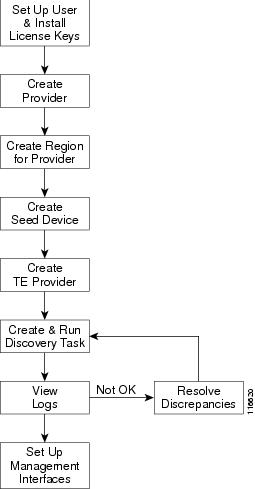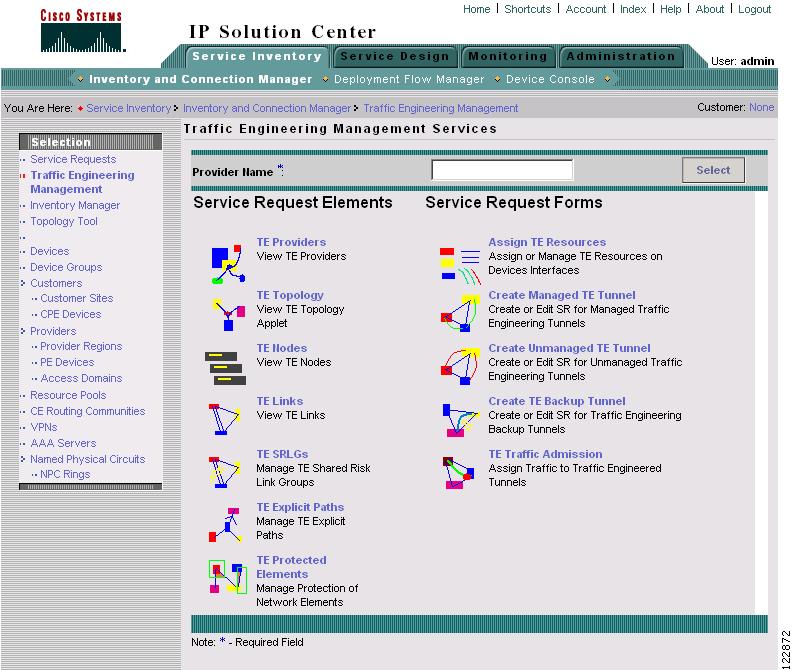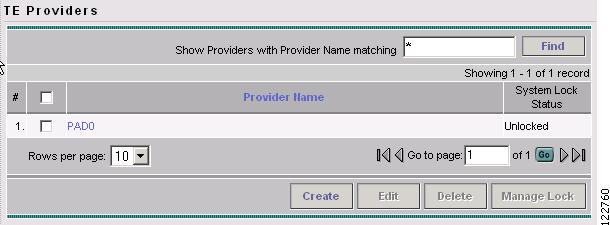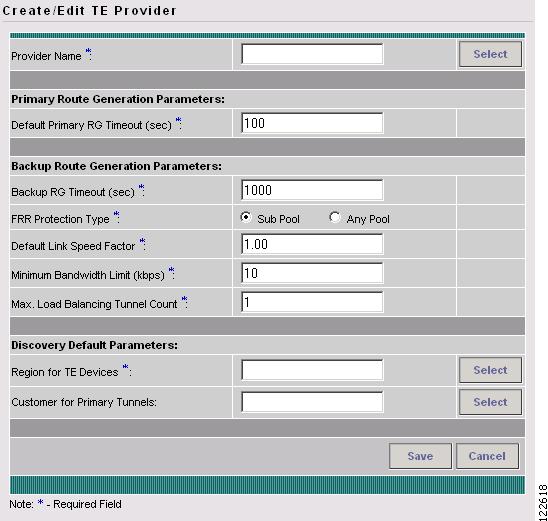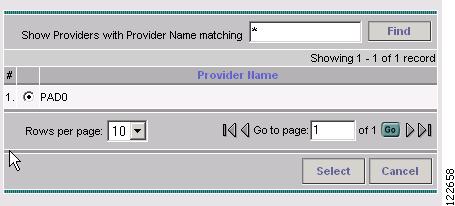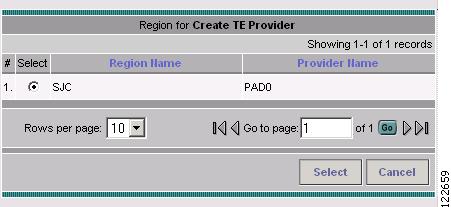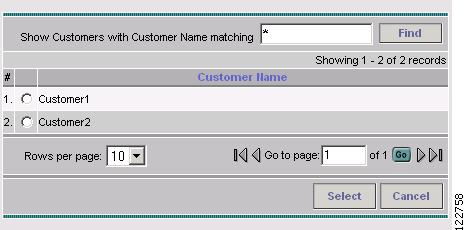

-
Cisco IP Solution Center Traffic Engineering Management User Guide, 4.0
-
Index
-
About This Guide
-
Introduction to ISC TEM
-
Setting Up the Service
-
TE Network Discovery
-
TE Resource Management
-
Basic Tunnel Management
-
Advanced Primary Tunnel Management
-
Protection Planning
-
Traffic Admission
-
Administration
-
Task Monitoring
-
TE Topology
-
Traffic Engineering Management GUI
-
Warnings and Violations
-
Document Type Definition (DTD) File
-
Table Of Contents
Bootstrapping Process Overview
ISC TEM Client Setup and Installation
Setting Up the Service
Cisco IP Solution Center Traffic Engineering Management (ISC TEM) offers the license structure described in "Introduction to ISC TEM." The ISC TEM specific installation steps are described in this chapter whereas the general installation procedure for Cisco IP Solutions Center (ISC) is described in Cisco IP Solution Center Installation Guide, 4.0.
This chapter contains the following sections:
•
Bootstrapping Process Overview
•
ISC TEM Client Setup and Installation
Bootstrapping Process Overview
The bootstrapping process sets up key parameters that enable the system to collect TE network information and subsequently deploy TE configurations on the chosen network.
An overview of the bootstrapping process is provided in Figure 2-1.
Figure 2-1 Bootstrapping Process
The process includes the following steps:
Step 1
Set up new user and install license keys—To run the TEM blade of ISC, it is necessary to create a new user and install license keys. These keys will enable the user to view and manage the TE tunnels and resources using ISC. (see ISC TEM Client Setup and Installation)
Step 2
Create a provider and a region for the provider—The provider is a concept designed to allow many different operators to work on ISC TEM simultaneously, each working on different networks. Thus, each provider has to be defined and used as a reference operator for future work on the system. The region is important because a single provider could have multiple networks. The region is used as a further level of differentiation to allow for such circumstances. (To create a provider and a region, see Cisco IP Solution Center Infrastructure Reference, 4.0.)
Step 3
Create a seed device—This IOS Device will be the seed router for network discovery. The network discovery process uses the seed router as an initial communication point to discover the MPLS TE network topology. A set of TE enabled devices, links, explicit paths, tunnels, and static routes are then populated to the database. (To create a seed router, see Cisco IP Solution Center Infrastructure Reference, 4.0.)
Step 4
Create a TE Provider—Providers can be defined as TE provider, if they are supporting MPLS TE in their network. It is necessary to create a TE provider to enable a TE network to be managed. All TE related data associated with a given network is stored under a unique TE provider. A provider and region uniquely define a TE provider (see Creating a TE Provider).
Step 5
Run Discovery Task—Discover the TE network for a particular TE provider to populate the repository with a view to creating primary and backup tunnels (see Chapter 3, "TE Network Discovery").
Note
If Telnet is selected to communicate with the seed router, Telnet must also be used for the other network devices. Likewise, if SSH is selected for the seed router, SSH must be used for all other devices.
ISC TEM Client Setup and Installation
Before setting up ISC TEM, the ISC software must be installed. To do so, see Cisco IP Solution Center Installation Guide, 4.0.
To set up a new ISC TEM user, one or more users with a TE role must be created. For step by step instructions, see Cisco IP Solution Center Infrastructure Reference, 4.0.
For an explanation of license keys in ISC, see Cisco IP Solution Center Infrastructure Reference, 4.0.
To install a TE license, use the following steps:
Step 1
Log into ISC with the following default values:
•
User Name: admin
•
Password: cisco
Step 2
Navigate Administration > Security > Users.
Step 3
Click Create.
Step 4
Fill in User ID, Password, Verify Password, and the Personal Information section.
Step 5
Click Edit to edit the assigned roles.
Step 6
Select TERole and click OK. TERole provides full access to ISC TEM. The TEServiceOpRole only has the privilege to access the tunnel admission SR.
Step 7
Click Save.
Step 8
Navigate Administration > Control Center > Licensing.
Step 9
Enter the three TEM license keys for TE, TE/RG, and TE/BRG successively:
•
Click Install.
•
Enter a license key.
•
Click Save.
Repeat the procedure for each license key.
Typing in all three license keys is the only valid installation.
Step 10
Log out as admin.
Step 11
Log in as the user created above.
You are now ready to start using ISC TEM.
Note
The admin role should only be used to manage ISC and not to perform network management operations.
Creating a TE Provider
After a provider and a region for that provider have been set up (see Cisco IP Solution Center Infrastructure Reference, 4.0), create a TE provider using the following steps:
Step 1
Navigate Service Inventory > Inventory and Connection Manager > Traffic Engineering Management.
The Traffic Engineering Management Services window shown in Figure 2-2 appears.
Figure 2-2 Traffic Engineering Management Services
Step 2
Click TE Providers.
The TE Providers window shown in Figure 2-3 appears.
Figure 2-3 TE Providers
For an explanation of the various window elements, see the "TE Providers" section.
Step 3
Click Create to create a TE provider.
The Create / Edit TE Provider window shown in Figure 2-4 appears.
Figure 2-4 Create/Edit TE Provider
For an explanation of the various window elements, see Create/Edit TE Provider.
To select a provider name, click the Select button next to the Provider Name field. The Provider for Create TE Provider window shown in Figure 2-5 appears.
Step 4
Add primary and backup route generation parameters. To understand Fast Re-Route (FRR) protection pools, see Bandwidth Pools.
Figure 2-5 Provider for Create TE Provider
Step 5
Select the desired provider using the radio buttons or search for a provider with search criteria matching a provider name and click Find.
Step 6
Click Select to select the desired provider. The Provider for Create TE Provider window closes.
The selected provider name is displayed in the Provider Name field.
Step 7
Fill in the remaining required fields (marked `*') and any optional fields as desired.
Step 8
For the required Region for TE Devices field, click the corresponding Select button. The Region for Create TE Provider window shown in Figure 2-6 appears.
Figure 2-6 Region for Create TE Provider
Step 9
Select the desired region using the radio buttons.
Step 10
Click Select to select the desired region. The Region for Create TE Provider window closes.
The selected region name is displayed in the Region for TE Devices field.
Step 11
For the optional Customer for Primary Tunnels field, click the corresponding Select button. The Customer for Create TE Provider window shown in Figure 2-7 appears.
Figure 2-7 Customer for Create TE Provider
Step 12
If desired, select a customer using the radio buttons or search for a customer by entering customer search criteria in the Show Customers with Customer Name matching field and click Find.
Step 13
Click Select to select the desired customer. The Customer for Create TE Provider window closes.
The selected customer name is displayed in the Customer for Primary Tunnels field of the Create / Edit TE Provider window.
Step 14
Click Save.

 Feedback
Feedback